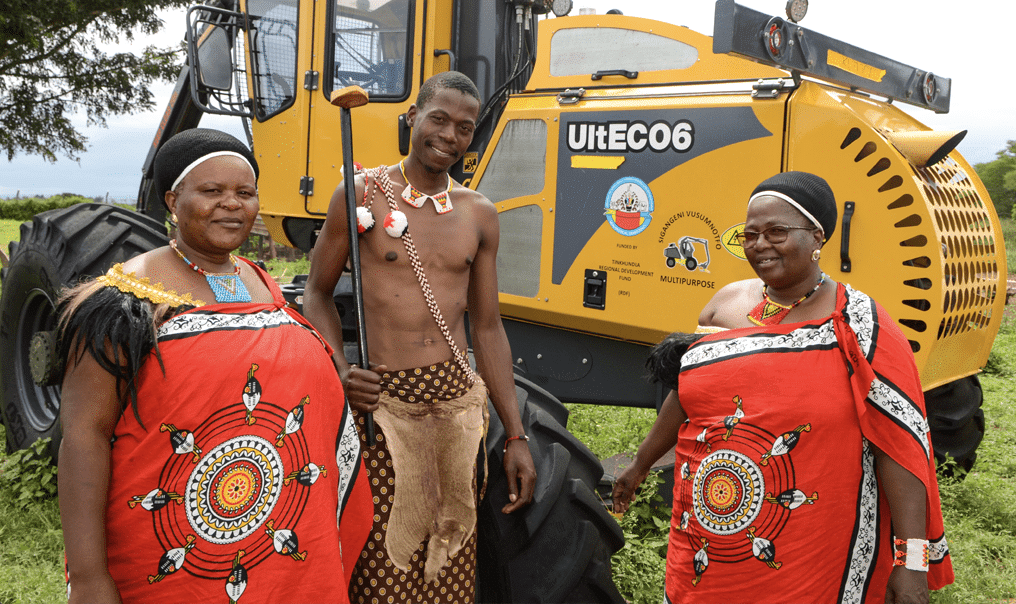Phindile Mbuyisa explains: “We have always planted our maize in October after the first rains and harvested it in May, but then had to wait for it to dry properly by August before selling the surplus that we could not consume ourselves. This created hardships amongst us, but through my work as a rural health motivator I heard from other motivators from the Northern Hhohho region that there was a shortage of cane loaders in the sugar industry.”
By accessing the country’s Regional Development Fund (RDF), the group sought to acquire a Bell UltECO6 Cane Slew Loader.
The RDF is a funding programme initiated by King Mswati III to eradicate poverty in his country. It entails people forming a group and depositing funds into a collective account to save towards a 10% deposit of the purchase price of a piece of mechanised equipment, or any approved business that could be utilised by the group at their place of preference.
The Inkhundla system – Eswatini’s traditional local government structure that plays a key role in community leadership and service delivery at grassroots level – then funds the balance of 90% and owns the equipment but allows the members of the group to earn an income from the equipment’s use.
“During one of the workshops I attended, I had heard that everyone was buying trucks in this manner and that there were already too many trucks,” Phindile continues. “What they did need, however, was loading equipment to load the sugar cane infield and I took this information back to the group we had loosely formed in our area.”
The group created a formal structure under the banner of Sigangeni Vusumnotfo Multi-Purpose Cooperative, consisting of 12 women and two men who committed to the plan by having enough capital to spare, gleaned from their maize sales. It was not a given that their proposal would be successful, but they did some intensive research and drafted a viable business plan, with valuable help on how to start a business from Mr Vusi ‘Futis’ Dlamini, a local businessman.
Philindile was elected as chairperson of the group and was assisted by fellow board members, Thembie Thwala, and one of the only two men in the group, Sibusiso Dlamini. She continues: “We all started contributing to our fund in 2021 when we could sell our surplus maize to the Eswatini National Maize Corporation and to companies making animal feeds.”
During this time the group also discovered which companies sold sugar cane loading equipment. This brought them to Bell Equipment’s door in Matsapha where they met Bell Swaziland Branch Manager, Charlie Boucher, and the local Bell Product Support Representative, Bruce Larkan.
“Both Charlie and Bruce patiently explained to us what they thought we needed, as they understood the concept. Bruce speaks fluent Siswati, which made the explanation so much clearer, allowing us to grasp the facts in our own language – something we really appreciated,” Phindile says. “More importantly though is the fact that we were taken seriously and not viewed as a group of rural people with an impossible dream.”
Board member, Thembie Thwala, adds that Bell Equipment’s pricing on a Bell UltECO6 Slew Cane Loader fitted their business plan and they told their group that they should be able to reach the required deposit by 2023.
Next, the group approached their local Siphocosini Inkhundla lead by Hon. Mduduzi Matsebula, the member of parliament, together with his team, the Indvuna yenkhundla Gcinmuzi Mavimbela and Bucopho Thamie Shongwe, who then approached the RDF with their proposal, amongst others. The business plan, coupled with the fact that they had the required deposit, worked in their favour and the deal was settled between the RDF and Bell Equipment.
“There was much joy on the Inkhundla land when the Bell UltECO6 Slew Cane Loader was delivered in April 2024,” Phindile recalls. “We sourced four operators with some experience from outside and employed them after they had received training from Bruce Larkan. 25 April 2024 was a momentous day for our group when the Bell UltECO6 Slew Cane Loader started earning an income for us.”
As the machine would be owned by the government, it was stipulated in the tender that a Bell Care Package over 24 months should be included in the warranty of the same length. It also included a set of tools that would be needed to service and repair the machine.
“The income from the use of the machine gets paid into a bank account. After a mere five months we had enough money saved to put down a deposit on a van to service the UltECO6 with fuel, lubricants, and personnel, as we had appointed a supervisor and use additional manual labour to pick up bits of dropped sugar cane,” Phindile continues. “The operators have a daily pre-start checklist and we’re very strict on the daily maintenance of the machine to ensure its longevity.”
The Sigangeni Vusumnotfo Multi-Purpose Cooperative’s Bell UltECO6 Slew Cane Loader is used around the clock with two shifts and typically loads between 12 to 18 trucks in a 24-hour cycle. Most trucks carry 30 tons of cane and the UltECO6 loads around 45 tons in an hour. In this way, it has already clocked more than 2 000 hours. Its diesel consumption of five litres an hour also fits the business plan of the group.
“We’ve enjoyed the support from Bell Equipment especially when it comes to servicing the machine,” says board member, Sibusiso Dlamini. “We give Bell advance notice of about 50 hours, and they always arrive at the appointed time and with the correct service kits and lubricants, which gives us peace of mind.”
While the cane harvesting season is relatively short, covering only 8,5 months of the year, the income the group has derived from this first cane loader cannot be underestimated. The pride in her manner is evident as Phindile explains that, looking forward to the next cutting season, the group is seriously considering acquiring a second UltECO6 Slew Cane Loader from Bell Equipment – this time financing and owning it themselves. Given their determination, we have no doubt that this will happen.



